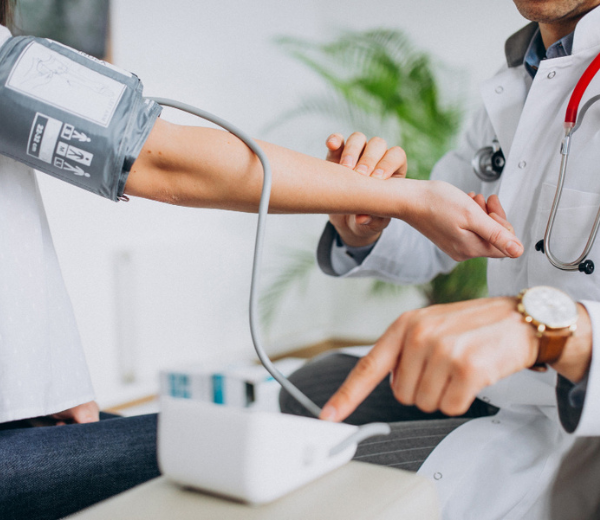
Why Should One Go for a Regular Health Check-up?
Regular health checks help to identify risk factors for certain diseases. For example, if high BP or cholesterol levels are detected in a person, they may be advised to make lifestyle changes (such as following a healthier diet and exercising regularly) to reduce their risk of developing heart disease or having a stroke
They also allow doctors to monitor the progress of any ongoing illness, even if it is chronic in nature, and to make necessary changes to the treatment plan.
So why should one wait until becoming sick before seeing a doctor?
Benefits of a Regular Health Check-up
- Increases the chance of leading a healthy life.
- Reduces the risk of late diagnosis.
- Timely detection of any serious or life-threatening condition.
- Increased chances of planning the treatment on time.
- Reduces the treatment cost.
How often should one go for a Full Body Check-up?
It is advisable to go for a health check-up at least once a year because many health problems do not show any symptoms in the early stages. By the time symptoms appear, the disease may have progressed to a more serious stage. It may detect health problems early when they are most easily treatable.
In case of any ongoing illness, the doctor might also request a medical check-up to know the progress of the treatment.
Types of Health Check-ups
There are many different types of full body health check-ups, and the specific tests and procedures included in a health check-up package may vary depending on factors such as a person’s age, gender, family history, lifestyle, and medical history.
A basic set of investigations includes a haemogram, fasting blood sugar, blood pressure, occult blood, lipid profile, liver and kidney function tests, lung function test, TSH for thyroid, uric acid, chest x-ray, ECG, heart rate, treadmill test (TMT), a urine and stool routine, Hepatitis B test, and ultrasound of the abdomen.
Additionally, the following tests must be included in a full body check-up package depending on one’s age and in consultation with a doctor.
- Glucose levels testing
- Cholesterol testing
- Blood pressure reading
- Eye checks
- Breast examination
- BMI, waist, and hip measurements
- Certain cancer checks
- Prostrate Specific Antigen test for men
- Mammogram for women
- Pap smear for women
- Sexually Transmitted Disease screenings (for sexually active adults)
- Dental check and cleaning
- Risk Assessment Test against Type 2 Diabetes
- Risk Assessment test against Cardiovascular
- Hearing impairment tests for adults
- Bone Density Test for Osteoporosis
- X-ray, Anthroscopy or MRO for Osteoarthritis
- Bowel cancer screening
What questions should be discussed with a doctor before getting a Preventive Health Check-up?
- The list of screening tests required.
- Whether family medical history is affecting one’s health.
- Any uncommon symptoms.
- Any lifestyle pattern affecting health.
- Previous illness or previous health report.
- Details of any ongoing medication.
What are the precautions to be taken before going for a medical health check-up?
- Follow the doctor’s instructions.
- A few tests may require fasting of 10-12 hours, and checking with the healthcare provider about it may be necessary.
- Ask the doctor if any ongoing medication needs to be paused for the medical test.
- The bladder is required to be full for an ultrasound.
- Avoid having excessive salty food at least 24 hours before the check-up to keep blood pressure and triglycerides in check.
- Don’t do any exercise before the health check-up.
- Avoid caffeinated drinks, alcohol, and smoking.
- Check with your doctor whether a test requires a full bladder.
- Avoid perfumes, powders, etc for tests like a mammogram.
- Avoid tampons, vaginal suppositories, creams, and sex at least 24 hours before tests like a pap smear.
- A few tests like urine, stool, and pap smear tests are recommended to be done 5-6 days after menstruation.
What is done in a routine medical examination?
Screening and test schedules normally are done as per your age, present health condition, and family medical history. They involve regular physical examination tests, blood pressure, cholesterol level check, BMI (Body Mass Index), eye examination, skin check-up, complete blood tests, and screening for sexually transmitted diseases.
Additionally, for women, pap smear and mammogram tests are done and for men, PSA screening for prostate cancer is done.
It’s always recommended to get details of the full body check-up price and select the health check-up package accordingly for the whole body check-up. The doctor can provide the guidance required so that unnecessary tests and their prices are not included in the full body checkup cost.
Conclusion
There are many reasons why one should go for a master health check-up despite feeling perfectly healthy. By doing so, one can catch any potential problems early and get the required treatment to stay healthy. There are many health check-up packages being offered as per the requirement but one must get the details of the full body check-up cost before finalizing it.
Additionally, regular health check-ups can help prevent future health issues by identifying lifestyle changes that one can make. So, no one should neglect their health and they must ensure to schedule regular check-ups with their doctor.
Well, many might think that it’s unnecessary to have a full medical check-up because they feel fine. But that is not the case! Having a regular health check-up done will ensure that one’s body continues to be healthy and can help detect any potential health problems early so that take steps can be taken to prevent them from becoming more serious. A whole body check-up is required for a healthy person as well as one for people with ongoing illnesses to check the progress of the treatment.